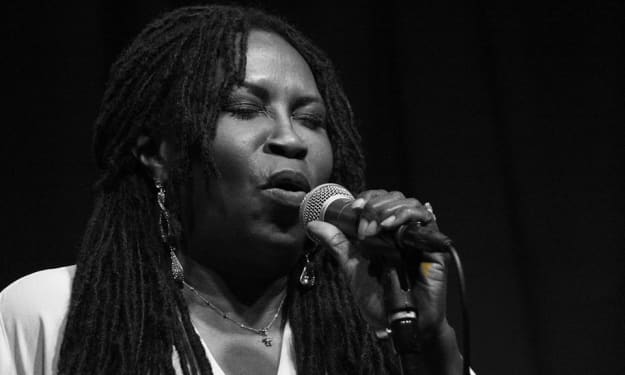Offshore Explorer Stories (Pt. 3)
The Casket Salesman
I have been accused of having a story for every circumstance by my dearest friends. I believe they think I am making the story up. I felt cut off and cut down not because they didn't believe me, but because I couldn't tell the story. The truth is that real storytellers see the world of circumstance and immediately put what seems like scattered facts into a cogent story. This is how storytellers organize their memories. It also helps to have a great memory for these kinds of facts.
A simple example: Yesterday my fiancé and I were discussing what to eat for dinner. Neither one of us wanted to go out or cook. We could order in, but nothing seemed appealing. So as a last resort, we decided to cook hot dogs, the least food preparation effort, and microwave some leftover chili and sauerkraut. While we were preparing our meal, we talked about one of the grandkids making a video of her making Nana's tuna fish sandwiches. I thought of my sister and the first meal she made for the family for her Girl Scout Merit Badge. She was ten years old, I think. She made us "Pigs in the Blanket" and baked beans. What I remember was my sister keeping everyone out of the kitchen while she cooked. My mother was worried she would burn herself with the over door or set her sleeves on fire over the stove. She had to stand on a stool to stir the baked beans. She had to wear her Girl Scout uniform while preparing the meal. To this day, 54 years later, I vividly remember my sister walking into the dinning room with a platter of "Pigs in a Blanket" with a huge smile of accomplishment on her face and her uniform spotted with baked bean juice.
Another story apropos for another common experience, my fiancé, who is quite used to my bending a story around a circumstance, simply smiled and asked why I ate all the potato chips.
Oral storytelling traditions have found a public platform with podcasts, YouTube, Oral Storytelling courses, and degrees. To be honest, they feel a little like short story writer's performance classes. They can be and often are beautifully put together stories. They often hit all the emotional marks and finish with an appropriate crescendo. True oral storytelling isn't about where we are going, it's about where we are. It's about the feeling of that particular moment. It's about color and nuance. Can you imagine my mother's nervousness about a little girl wearing a Girl Scout uniform with a sash and beret staring a pot of baked beans over an open flame while standing on a kitchen stool while she insists she must cook alone or it doesn't count for a merit badge?
Oral storytelling isn't about one punchline, it's about 20 punchlines that meander in and out of the story thread. At the end of the day, you end up with a piece of cloth, not a rope with a knot on the bitter end.
I could riff on several stories about merit badges, or my various experiences with hot dogs far and wide. There is a lot of landscape to wander across. Lot's of places to stop and ponder. Plenty of places to drink in life.
I believe storytelling is somehow inherited; whether it comes from the heavens or it's found on a dusty country road, not all of us have the ability. Most people who think they have the storytelling gene probably are deluding themselves. My father thought he could tell a story. He couldn't. He would tell a story at dinner. We would nod and fake laugh, but he knew he wasn't good. My uncle Rich liked to fancy himself as a storyteller. He was close, but no cigar. He understood structure and could be entertaining when drunk, but there just wasn't that sparkle. He basically had one story he would repeat without much variance. Again we would smile and laugh at him for being a drunken fool. The master of the family storytelling was my uncle Willard. He may have been the greatest undiscovered storyteller of his generation and he was a casket salesman.
Uncle Willard was born in Scranton, Pennsylvania in 1922. He was a coal miner's son. He lost his parents early in his life to yellow fever. He was raised by a step-aunt. We called her Grandma Nichols. I remember her as mean, crotchety, and having a bad, but hilarious habit of letting her teeth fall out of her mouth into her lap while she talked. She spread darkness and fear everywhere she went. Uncle Willard worked in the mine as a 12-year-old. He bought a yellow and beige convertible Buick when he was 16 years old. Later, he drove coal trucks from Scranton to New York City. He gave a lift to Marylin Monroe once before she was famous. He told me he always had the gift for storytelling, but he really got good after he was shot down over Germany during WWII and spent three years a prisoner in a German Stalag.
For three years he entertained his fellow captors in their hour of need by telling stories every evening after lights out.
I couldn't imagine the circumstances. They were POWs who were beaten, starved, and kept in a constant state of fear. I asked my uncle what stories he told. He laughed. He had this interesting pliable face. He would run his hand over the length of his face, seemingly adjusting all the facial muscles. He told stories about his day. He tried to keep away from telling stories about home, but he said that was hard to do. The men he said liked hearing stories about home.
He created a character called Mr. Rats. Mr. Rats had the run of the stalag. He also had a wicked sense of humor. Mr. Rats' prime targets were the guards and the commandant.
He often used Grandma Nichols' grumpy nature to be the foil in stories about home. He didn't want home to be too good, because they weren't sure they would ever live to get home. So a little shade, as he called it, gave the story about home a not always perfect feel. In turn, it made the circumstance of living in a freezing barrack under threat of death relatable. At some point, I thought every subject must get exhausted. Willard laughed. He took a drag on his Camel cigarette. He sipped his PBR beer and said for a true storyteller, there is never a shortage of tales to tell, curiosities to report, or strange circumstances to observe. All you have to do is just wander around a little in your memory.
When uncle Willard came home from the war, he took up driving tractor trailers cross country. My first memories of him were him wearing a tight white T shirt with his pack of Camels rolled up in the short sleeve on his upper arm. This is when Willard met Norma Jean.
He was driving a tractor trailer from Barstow to Los Angeles California. The trailer was filled with barrels of "Mr. Pickles Kosher Pickles."
Willard had trouble delivering the pickles. There was a foul up with the billing and the laden bills. He had driven from Scranton to Barstow to deliver pickles. Now he was stuck with the pickles and his truck transmission gave out. The only way to get back home was to sell the pickles to pay for repairs and diesel.
He picked up a hitchhiker outside Barstow. Norma Jean climbed up into the cab of the truck and shook uncle Willard's hand firmly and told him she was going to make it big in Hollywood. Willard said he believed she was right. He asked her if she could help him sell the pickles. He would split the profit with her 80/20. She agreed. She sat back in the passenger seat and put her cowboy boots on the dash. They were partners in the pickle business.
"The long and short of it." A phrase he used as a transition to another aspect of the meandering story. He likened its use to crossing a stream in the woods. Same woods, just a totally different bank. (I use bank as both a bank on the stream and to bank. Accessing new stories from vault.) The long and short of it, is we sold the pickles and who wouldn't buy Kosher pickles from a beautiful girl. Mr. Pickles became a big deal in LA. They sold all the pickles. Willard was going home to Scranton. Norma Jean got a job at a restaurant where they loved the pickles. She was discovered in that restaurant to become Marylyn Monroe. Thanks to Mr. Pickles.
Later, he was telling the story to some fellow veterans and POWs at a VFW convention where Marylyn Monroe was going to make an appearance with Joe Dimaggio. His friends didn't believe him. Marylyn saw him sitting at a table and come over. She kissed and hugged him. She asked how the pickle business was doing? Joe Dimaggio said she talks about Willard and his Mr. Pickles truck all the time. Willard's friends were dumbfounded.
When I was 12 years old, I spent two weeks driving around Northeast Pennsylvania and Southern New York with my uncle Willard visiting funeral homes and selling caskets. Willard loved to say when he handed his card to a funeral director that people were dying to do business with him!
I have written the screenplay The Casket Salesman about those two significant weeks of my young storytelling life. Presently, the screenplay is in development at Lionsgate. With luck, we will get to see it soon.
The point of this little essay is to tell my dear readers what influences have formed my storytelling. I was told by my Uncle Willard to keep practicing because even an acorn grows into an oak, but you have to be an acorn first.
The purpose of these stories is to give some insight into how I became a storyteller in films and on television. When you view an episode of Offshore Explorer, you will know and I hope enjoy my storytelling tapestry.
Thanks for reading.
Please like and share. Sharing stories gives them life beyond the moment. Stories are our humanity.
About the Creator
Scott Dodgson
Is a produced screenwriter, producer and film director. He is a a world class sailor and has spent decades exploring the world by boat.






Comments
There are no comments for this story
Be the first to respond and start the conversation.